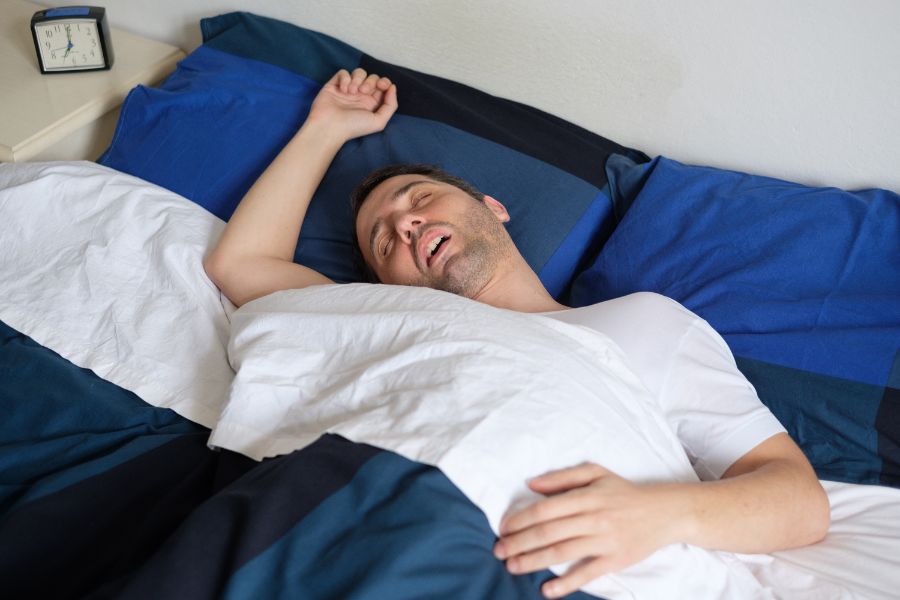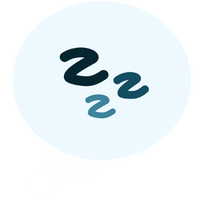It’s a running joke between some couples that one person snores while the other flat denies it because they can’t hear it.
But why can’t you hear it if it’s as loud as they say? Or perhaps you do hear it and are wondering if other people wake themselves up snoring too.

Here, we reveal all the answers as we look at the question, can you hear yourself snore?
Why Do We Snore?
Before we talk about whether we can hear ourselves snore, we need to consider a more basic question – what is snoring?
When we sleep and our bodies relax, snoring occurs as air passes through our soft palate, tonsils, adenoids and tongue.
If there is some kind of blockage, these tissues vibrate – and blockages may have several causes, including enlarged adenoids, big tonsils or a large tongue.
Snoring can also be caused by alcohol consumption or nasal congestion from an allergy or the common cold.
Snoring is extremely common. It is thought that around 45% of adults snore sometimes while 25% snore often.
Snoring is more common in middle-aged men and older and in post-menopausal women – as well as in people who are overweight.
Snoring from time to time is quite normal and is nothing to worry about. However, chronic snoring accompanied by poor sleep quality and daytime drowsiness may be symptoms of a more serious condition, something we’ll come back to at the end of this post.
However, even if your snoring isn’t anything to worry about, it may impact the sleep and ultimately the quality of life of the person you share your bed with.
So if your snoring keeps your partner awake all night, why doesn’t it wake you up?
Let’s look at that now.
Why Doesn’t Snoring Wake Us Up?

While we sleep, we cycle through several phases of sleep, and while we are in the deepest phases of sleep, a part of our brain called the thalamus filters the noises we hear, relegating the sound of our snoring to the status of a “low priority” noise.
And there’s a reason for this.
We need to sleep, and if we don’t get enough sleep, our mental and physical health quickly deteriorate. So to allow us to rest, our brains filter out less important sounds so we can ignore them while alerting us to sounds that could mean danger.
This is why we can sleep through regular sounds like the ticking of a clock or the sound of rain, but we will often wake up if we hear a random noise like a crash or something else unexpected.
Similarly, we are more likely to wake up if we hear our own name than if someone just says a random word.
So while our brains register the sound of our snoring, they classify the noise as something we don’t need to worry about and just let us carry on sleeping right through it. This is known as “habituation”.
Unfortunately, it’s much more difficult for someone sleeping next to you to filter out the sound of your snoring in the same way, which is why you will continue to sleep like a baby while they have little chance of even dropping off.
Hear Yourself Snoring and Wake Up
But that’s not the whole story…
There’s more to it than just this though because as it happens, it’s possible that snorers do wake themselves up during the night – but they just don’t realize it.
As it turns out, it’s thought that people can wake themselves up with their loud snoring, but they only experience what’s known as a “micro-arousal”, which means they only briefly wake up for a few moments before returning to their previous sleep state.
Then, the next morning, the sleeper has no recollection of any of these micro-arousals, and if they otherwise slept soundly, they wake up feeling refreshed after a good night’s sleep.
A study was carried out by the University of Michigan Sleep Disorder Center to test whether snoring was indeed responsible for causing the micro-arousals.
Two groups of people were monitored as they slept. One half was given earplugs to wear to block the sound of snoring while the other half slept without earplugs.
Their brainwaves were then monitored as they slept to attempt to count the number of micro-arousals.
The results of the test were ultimately inconclusive, but the evidence did suggest that those without earplugs experienced more micro-arousals than those with them.
What this experiment may show, then, is that in a way, you can hear yourself snore while you’re asleep, even if you’re not aware of it.
Hearing Yourself Snore as You Doze Off
There’s still more though, because some people are convinced they can hear themselves snoring as they drop off to sleep – and this is something different.
When we first fall asleep, we are still in the early phase of sleep, which is still quite a light sleep.
Although we are more likely to snore when we reach the deeper phases of sleep, it’s still possible to start snoring in the lighter phase of sleep.
When this happens, possibly because they are not sleeping deeply enough for the thalamus’ noise filtering capability to kick in fully, many people anecdotally report hearing themselves snoring and even waking themselves back up.
So if you’ve ever asked yourself the question, is it weird I can hear myself snoring? the answer is that actually, it isn’t!
Sleep Apnea

Earlier, we mentioned that chronic snoring may also be a sign of something more serious, so now let’s talk about that.
Sleep apnea is a condition where the sleeper stops breathing temporarily during the night, something that can last between 10 and 30 seconds – and in extreme cases, as long as two minutes.
This can happen up to 20 or 30 times per hour, and the sufferer typically snores between episodes.
However, in the morning, you won’t remember waking up during the night, although you will probably feel groggy as if you’ve had little sleep.
Each time you suffer an episode, your brain sends a shot of adrenaline through your body just as if someone had shaken you awake.
Since this happens many times each night, it leads to very poor sleep quality without the sufferer ever being aware.
However, this may lead to other serious symptoms developing, which may include:
- Irregular heartbeat
- High blood pressure
- Heart attack
- Stroke
- Daytime sleepiness
- Increased risk of motor vehicle accidents
Not everyone who snores, even chronically or loudly, suffers from sleep apnea, but if you are known to snore and you also experience some or all of these symptoms, you should speak to your health professional about it as soon as possible.
If the person you share your bed with notices you choking in the night in between snoring, you should also seek medical health as soon as possible.
Also Read: Why Am I Snoring All of A Sudden?
Usually We Can’t but Sometimes Maybe We Can!
So the answer to our original question, can you hear yourself snore? is: not usually but maybe sometimes.
Thanks to the filtering function of the thalamus, we can usually get a good night’s sleep if we snore. But it’s possible that we still experience micro-arousals from our snoring – and sometimes, we might wake ourselves up snoring, even before we’ve fully nodded off.
